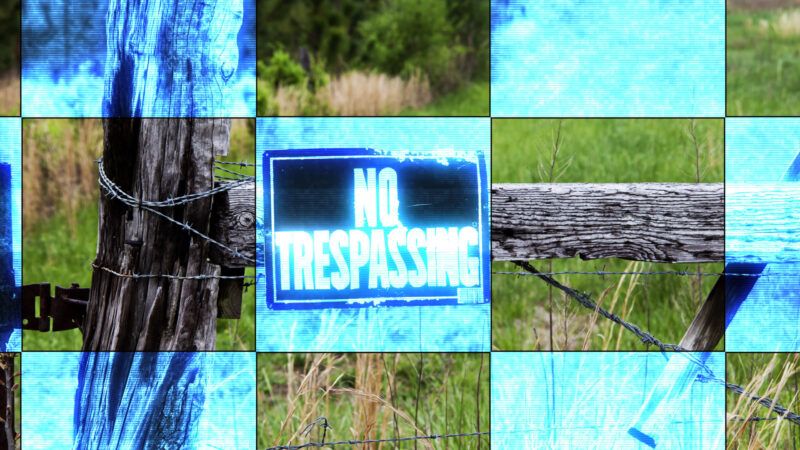Tennessee Appeals Court Rules Against Wildlife Agents Who Planted Cameras on Private Land
The three-judge panel concluded unanimously that while the state law at issue is constitutional, the wildlife agents' application of it was not.

In December 2022, Reason reported that both state and federal wildlife agents routinely trespass onto private land and plant cameras. Two Tennessee homeowners successfully sued the state over the practice, and a three-judge panel ruled in their favor. The state appealed the decision, and this week the court of appeals ruled in the homeowners' favor.
At issue is a state law allowing officers of the Tennessee Wildlife Resource Agency (TWRA) to "go upon any property, outside of buildings, posted or otherwise," in order to "enforce all laws relating to wildlife." In the case of Terry Rainwaters and Hunter Hollingsworth, TWRA officers not only entered their respective properties but also installed trail cameras to look for hunting violations, all without a warrant and ignoring "No Trespassing" signs. A lawsuit filed by the Institute for Justice (I.J.) on behalf of Rainwaters and Hollingsworth asked the court to declare the law unconstitutional and issue an injunction against the TWRA, barring it from carrying out any further unwarranted intrusions.
Under the "open-fields doctrine," Supreme Court precedent dating back to Prohibition holds that undeveloped land on someone's property lacks the same rigorous Fourth Amendment protections as their home and the "curtilage," the area immediately surrounding the home.
In March 2022, a three-judge panel from the Benton County Circuit Court ruled in the homeowners' favor, finding that the state constitution provided more protections than the Fourth Amendment. It determined that the state law allowing the TWRA practice created an "intolerable risk" of abuse and was "facially unconstitutional," but it stopped short of issuing an injunction. The state appealed the decision the following month.
In a hearing before the Tennessee Court of Appeals Western Section on June 20, 2023, I.J. attorney Josh Windham argued that the state law is unconstitutionally broad. "It allows TWRA officers to enter and roam around private land, fishing for evidence of crime," Windham said. "It doesn't require consent. It doesn't require warrants. It doesn't require probable cause….It's a blank check for officers to invade private land whenever and however they please."
Amanda Jordan argued for the Tennessee Attorney General's office that the statute was not unconstitutional and that the policy was necessary for the TWRA to do its job. She argued that "it's the particular purpose and function of the TWRA which makes such warrantless entry reasonable."
Judge Jeffrey Usman asked Jordan why, if the state would need a warrant in order to enter someone's property to look for criminal violations, it should not also need a warrant to do the same for civil violations of hunting laws. Jordan agreed that "while normal law enforcement officers would not be able to enter" without a warrant, "you have to look at the state's interest in furthering its duty of protecting and preserving" Tennessee's wildlife.
But Usman pressed further, asking whether the state has "an even stronger interest in protecting persons than wildlife." Further, he asked, "If you can't enter to investigate a crime being committed against a person…why is the interest greater to enter to protect wildlife?"
In a decision issued Thursday, the court of appeals ruled in favor of the property owners. The TWRA claimed that the homeowners' claims of injury were "speculative" as "TWRA agents have not entered the Plaintiffs' lands since September 2018." The court disagreed: Writing for a unanimous court, Usman noted in the decision,
Even if the TWRA has not entered the Plaintiffs' properties since 2018, it continues to assert its power to do so. The TWRA has asserted a continuing right to enter upon the Plaintiffs' properties. At oral argument, the TWRA suggested that if the Plaintiffs want to keep the TWRA off of their land in the future that they should desist in hunting.
"At the most foundational level," the court determined, "the statute is facially constitutional because there are applications of the statute that are constitutionally permissible," including "wild waste land areas." But in this specific scenario, where wildlife agents planted cameras on homeowners' land without ever even pursuing a warrant, the court found the TWRA's actions unconstitutional as applied.
"The TWRA's contention is a disturbing assertion of power on behalf of the government that stands contrary to the foundations of the search protections against arbitrary governmental intrusions in the American legal tradition, generally, and in Tennessee, specifically," Usman wrote. "What the TWRA claims is reasonable is not."
"Our entire theory of the case was vindicated by this decision," Windham tells Reason. "The part that goes against the trial court ruling [says] that the statute can be constitutionally applied to land where people haven't taken any steps to exert control or exert their privacy, which is a rule we don't particularly object to."


Show Comments (16)